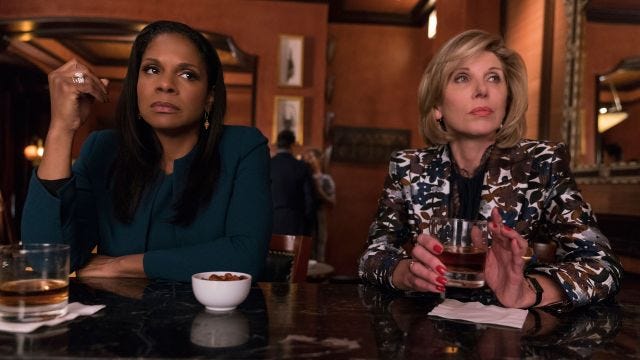Lady Business: The Good Fight and other quarantine distractions
Hello and welcome to Lady Business, a newsletter about women, the business world, and all the ways they overlap. You can sign up for Lady Business and read previous issues here. This is the 101st issue, published May 10, 2020.

Good Old Fights
In this, week 5198 of our global lockdown, I finally crossed off a pop-culture goal I’ve been meaning to accomplish for years. I* signed up for the idiosyncratic streaming platform known as CBS All Access, and started watching The Good Fight.
*By which I mean my father, current housemate and generous provider of various streaming-platform passwords to my now-late-30s self.
And, just as everyone who knows me and loves the show has been telling me I would for years, I really do like it! My reluctance had less to do with platform fatigue and more to do with the bad-breakup scars from The Good Wife, the prequel that I adored and wrote about often, and that imploded spectacularly by its end. I’m now halfway through two of The Good Fight’s four-so-far seasons and, in true bitter-ex fashion, am finding plenty of reminders of the things that I both loved and loathed about its predecessor.
On the positive side, it’s a smart, fun, feminist show about people who know that they’re smart and good at what they do. It’s beautifully-dressed competence porn surrounding a white-hot core of feminist rage, written with the panache of Aaron Sorkin minus his pomposity or misogyny. It makes 68-year-old Christine Baranski its (fascinating, extremely well-deserving) professional and romantic heroine. It has the best credits sequence in the history of television. And it continues The Good Wife’s tradition of telling some of the best modern stories about how technology and its creators have invaded our lives, usually to our detriment.

On the negative side, there’s its tendency to neglect some of its characters, to disappear others with no explanation, and to yank personalities sideways in order to fit its plot. There’s also the legacy of The Good Wife’s mixed, to be generous, track record of handling race and writing for its black characters -- who are, at least, much more numerous in The Good Fight than in its predecessor!
I’m hoping that this gets better over the two seasons I have yet to watch, and that have drawn widespread critical praise. The first season was a lot of “Christine Baranski, Ygritte from Game of Thrones, and Friends”; the early second season has gotten better, but also tends to repeat story beats for its black protagonists. (Multiple early episodes have involved senior, experienced lawyers discovering that they’ve been tapped for professional opportunities contingent upon them playing the “angry black person” stereotype for white audiences. I don’t doubt this happens with tedious regularity in the real world, but its repetition in the show makes me wonder if the writers couldn’t think of any other stories to tell about these characters instead.)
The other thing that has given me pause, watching this as a break from the overwhelming bad-news firehose of These Strange Times, is how quickly dated some of The Good Fight’s stories have become. Its timeliness, and its willingness to write stories directly about the effects of the Trump presidency, is one of the things that’s caused so many people and critics I admire to praise the show. But two years later, some of that specificity now feels like ancient history. For example, while I’m sure an episode about legal strategies for presidential impeachment would have felt timely and prescient in 2018, it’s now a casualty of the binge-anytime Streaming Age -- and of the pandemic. (Do you even remember back when impeachment was the major national news story?)
Which probably just means that it was my fault for sleeping on the show this long. Given the choice between vaguely ahistorical fiction and timely critiques of current events, I usually prefer the latter. (9/11 retellings aside, at least.) I’m looking forward to catching up to The Good Fight’s present-day -- and, eventually, watching what it has to say, if not about the pandemic itself, its infinite aftershocks.
Lady Bits
--"Um, no I’m loaded.” An interview with Ann Patchett on outlining, fact-checking novels, and financial success. It's pegged to The Dutch House, which I mostly enjoyed and really admired. I’m always a sucker for a modern fairy tale, but I keep going back and forth on whether its charming, oblivious male protagonist was the best choice to narrate a novel about the impossible choices and sacrifices of the interesting women around him.
--Congratulations to my book’s fabulous publicist, Morgan, on the birth of her son, and happy Mother’s Day to her, my wonderful mother, and all who celebrate!
Thank you for reading, commenting, and subscribing to this newsletter! Please tell your friends to sign up here, let me know what you think about this week's issue, and what else you'd like to see me write about: maria.aspan@gmail.com


